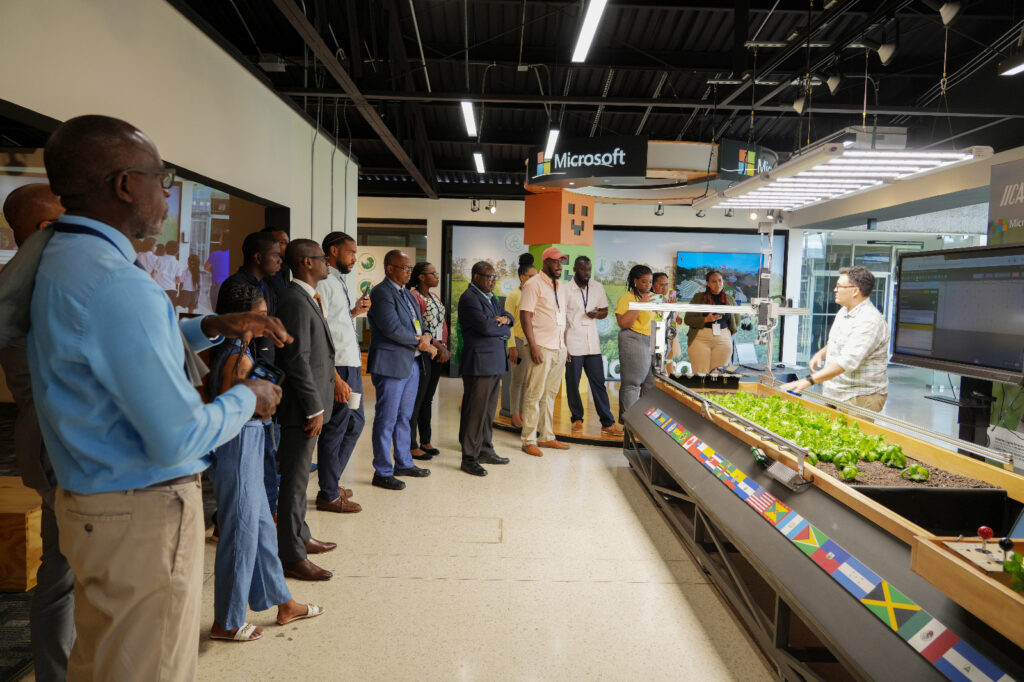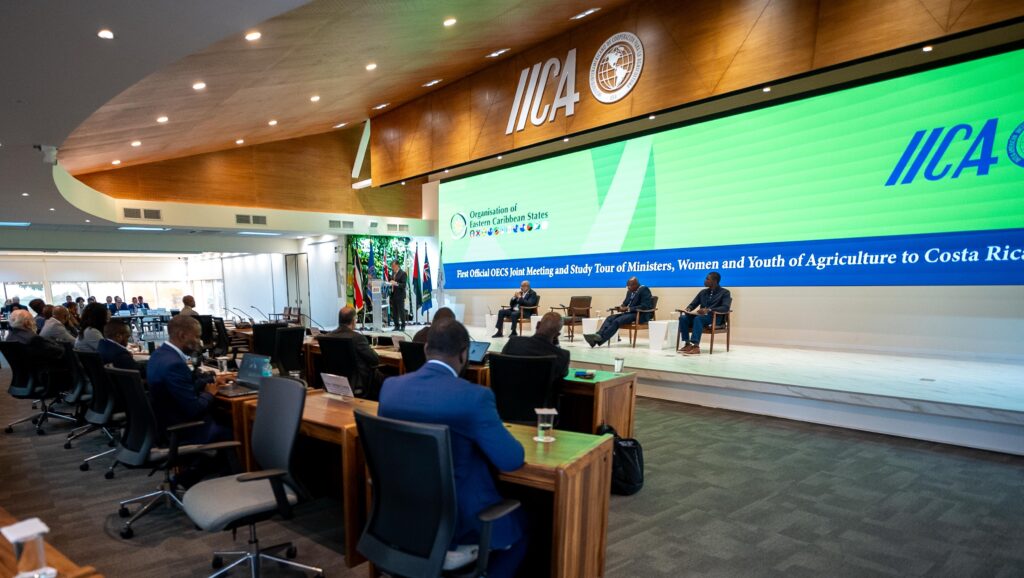
Eastern Caribbean delegation begins historic visit to IICA to promote digital agriculture and food security.
San José, 27 May 2025 (IICA). Ministers of agriculture, senior officials, and rural women and young people from the Eastern Caribbean nations began a historic joint work and study visit to the Headquarters of the Inter-American Institute for Cooperation on Agriculture (IICA), with the aim of accelerating collaboration in areas such as the digitalization of agriculture, entrepreneurship, and food security.
The mission was organized by the Organisation of Eastern Caribbean States (OECS) in conjunction with IICA, part of the ongoing efforts to deepen cooperation between the two entities on issues related to sustainable agriculture, climate action, rural development, and other country-specific projects.
The OECS is a grouping of twelve islands in the Eastern Caribbean. Six of its founding members are also members of IICA: Saint Lucia, Saint Vincent and the Grenadines, Grenada, Dominica, Antigua and Barbuda, and Saint Kitts and Nevis. These are island nations whose agriculture sectors are vulnerable to natural hazards. In recent years, they have received technical and financial assistance from IICA to improve their resilience and sustainability, while also striving to boost local production.
IICA is collaborating in the implementation of the Food and Agriculture Systems Transformation (FAST) Strategy, which was designed by the OECS with a cooperative approach.
Participating in the event are OECS Director General Didacus Jules; Dominica’s Minister of Agriculture, Fisheries, Blue and Green Economy, Roland Royer; Saint Kitts and Nevis’s Minister of Agriculture, Fisheries and Marine Resources, Samal Duggins; Saint Lucia’s Minister of Agriculture, Fisheries, Food Security and Rural Development, Alfred Prospere; Grenada’s Minister of Economic Development, Planning, Agriculture, Lands, Forestry, Marine Resources and Cooperatives, Lennox Andrews; and Saint Vincent and the Grenadines’ Minister of Agriculture, Forestry, Fisheries, Rural Transformation, Industry and Labour, Saboto Caesar.
More than 20 young people representing farmers’ organizations from IICA member countries in the Eastern Caribbean and other islands in the region, such as Anguilla, the British Virgin Islands, and Montserrat, also traveled to IICA Headquarters in San José, Costa Rica.
IICA Director General Manuel Otero participated in the activities along with the Institute’s Director of Technical Cooperation, Muhammad Ibrahim; the Deputy Director General, Lloyd Day; the Director of External and Institutional Relations, Beverly Best; and the Special Advisor to the Director General, Jorge Werthein.

OECS and IICA strengthen their partnership to advance sustainable agriculture and climate action.
Historic and transformative visit
The first Youth in Agriculture Symposium was organized by the Organisation of Eastern Caribbean States in Dominica, providing a platform for dialogue and the exchange of ideas and innovations.
IICA partnered with this initiative and took part in several knowledge-sharing activities and high-level discussions on issues such as climate-smart agriculture and technological innovation. This led the Institute to include young people from OECS Member States in this year’s visit to IICA Headquarters.
Didacus Jules described the visit to IICA by rural women and young people from the Caribbean, along with ministers of agriculture, as “historic and transformative.” He referred to the current global challenges, especially those that Caribbean nations face due to their vulnerability.
“We are not living in an era of change, but in a change of era. We are facing a global crisis defined by geopolitical instability, climate shocks, and the fragility of global supply chains,” Jules said.
“The crisis is too good an opportunity to waste. It forces us to do what we knew we should do, but which until now we hadn’t been able to do,” added Jules, who highlighted IICA’s role and suggested that Manuel Otero “has understood that technical cooperation, when guided by empathy and science, becomes transformative.”
Grenada Minister Lennox Andrews emphasized that the training visit of Caribbean rural women and young people to IICA reflects a commitment to sustainable development that could mark a turning point for agriculture in the region.
“We are convinced that we must work together and create the conditions for women and young people to become increasingly involved in agriculture. For us, as ministers, they are an inspiration,” said Andrews, who noted that IICA’s work is crucial to building a better future in the region.
Michael Joseph, a young farmer from Antigua and Barbuda, described the study trip to IICA with colleagues from different Caribbean islands as an opportunity to learn innovative practices, become acquainted with technologies, and connect with other people. “I hope this is the beginning of something big in the Caribbean. It’s a fantastic experience, and we’re interested in deepening the implementation of technologies, which is essential for knowledge to move beyond being simply potential,” he remarked.
IICA projects
Muhammad Ibrahim gave a summary of IICA’s ongoing work in the Caribbean, which includes projects involving innovation and the bioeconomy, international trade, territorial development, and family farming, among other topics.
“Some of the specific issues on which IICA, at the countries’ request, has provided its technical expertise in the Caribbean have been the prevention and control of TR4, a disease that affects banana growing, the development of new varieties of pineapple and coconut, and the integration of family farming with agrotourism,” Muhammad explained.
Otero stated that the six IICA member states that are part of the OECS have received resources to recover from natural disasters that affected their productive capacity and the living conditions of rural communities.
“IICA,” he pointed out, “has provided funding to support rehabilitation efforts and leveraged our strategic partnerships to donate relief supplies and seeds from partner governments within the Americas, particularly Brazil, Argentina, Uruguay, and Chile.”
“Despite our active support for agriculture and rural development in the Caribbean over the years, we recognize that our work is not yet complete, and we are presenting some key technical cooperation initiatives that we will immediately implement in support of the region. These initiatives will be directly funded by IICA this year,” he announced.

Ministers from the Eastern Caribbean, along with rural women and young people, are visiting IICA to promote territorial transformations.
Some of these projects involve training young farmers, combating diseases that affect animal and crop production, and seed programs in response to natural disasters.
The IICA Director General concluded by urging young people to play a full part, create networks of contacts, share their experiences, and take maximum advantage of their interactions. “Young people are the future,” he said, “and they must be at the forefront of change.”
More information:
Institutional Communication Division.
comunicacion.institucional@iica.int











